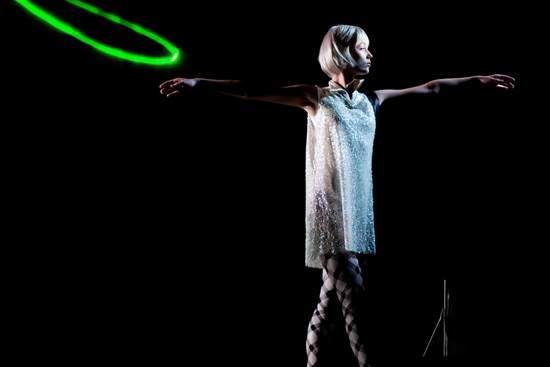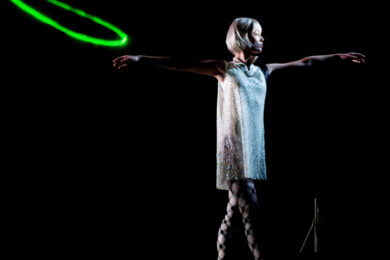There was a lovely moment during The Knife’s ‘Tomorrow, In A Year’ at the Barbican last week when a house beat kicked in and all the dancers onstage started bodypopping, and someone sniggered. It was lovely because a) everyone in that audience looked way too beard-strokey to even be capable of sniggering and b) it broke the spell of unnatural reverence towards a production that nobody could pretend to fully understand. We might have been at a sold-out opera, but most people were there because of Silent Shout and Deep Cuts, because they were curious as to what the elusive Swedish duo could possibly have to do with an art form perceived as archaic, outdated, a relic from another time.
John Cage once called opera "an ornament of the lives of people who have… that has no necessary relation to the 20th Century." He should know: he was invited by the Frankfurt Opera to write five just before his death in 1992, and called them all Europera. Like all of Cage’s work, the Europeras were fiercely unconventional. One stage direction had a singer emerging from a zipped-up bag shaped like an igloo, being dressed up in pantomime donkey ears by an assistant, narrowly missing having his head taken off by an oversized Mynah bird screeching "Verdi! Verdi!" and then crawling off the stage on all fours, all within the space of one scene. There were no conductors, no narratives, just huge ticking clocks that told the singers when to belt out their favourite arias and when to hop off stage to roaring soundtracks and flashing lights.
Cage hated the snobbery attached to opera – the grand opera houses that rubbed shoulders with palaces in European cityscapes, the backwards facing productions they hosted, the rituals and the dress. He wanted to tear down the ivory towers and throw the mangled arias back to their birthplaces in Europe. In short: in writing five operas he hoped to kill off the form.
But cultural forms, once established, are resistant as weeds – just ask the Gallagher brothers – and cultural narratives invariably find ways of evolving through time. That Cage conceived of his operas in opposition to conventions doesn’t make those conventions any less real. Opera (the word means ‘work’) demands that a synthesis of words, music and action reflects the story that unfolds onstage, but like Darwin’s mutating species, the various interpretations of this have never been static.
When The Knife were invited by Danish performance troop Hotel Pro Forma to write an opera about Darwin they chose subjects rather than stories – the man, his discoveries – to evoke onstage. As such there is little narrative for the audience to hang onto during the performance. We see glimpses of Darwin’s personality during Annie’s Box, a melancholy aria about the death of his young daughter. The petite ballerina who represents her onstage continues dancing through scenes to the end, just as her memory was never lost to her father.
What little narrative can be grasped derives from discovery at a biological, rather than chronological, level. Dancers seem to evoke evolving creatures, flicking their bodies and jerking their way across the stage in futuristic dress. The stage itself features blocks of coloured lights. Images of birds and animals appear above the singers and dancers, and mezzo-soprano Kristina Wahlin sometimes outlines their forms with a laser pointer. Lasers are also used to spell out passages from Origin Of Species and to show growing plants in a sea of dry ice, as Jonathan Johansson, in a fetching mustard cardigan, sings ‘Seeds’. It looks a bit naff at times, but if it wasn’t for the laser the whole staging would be a big mess of colours and characters and too Cage to be moving beyond anarchic form.
‘Colouring Of Pigeons’ is the only song that sounds like it could be a pop single, but it’s completely spoiled by the vocals of Laerke Winther, which sit flatly in the spaces where Karin Dreijer excels on record. Yet as opera rather than pop, we have to expect that other vocalists will perform the scores written by The Knife, an interesting conundrum presented by the interaction between the two genres.
Have we ever really seen a pop opera? Can it even be done? Lady Gaga described her Monster Ball Tour as "the first-ever pop electro opera" last year and ITV have dedicated an entire series into turning pop stars into opera stars, helpfully called ‘Pop Star To Opera Star’, hosted by Katherine Jenkins and Andrea Bocelli, two ‘opera’ singers who have rarely, if ever, performed an entire opera.
Operas are about more than a few out-of-context arias belted through a microphone in a warbly voice. Pete Townshend understood that operas have narrative when he embarked on Tommy in 1968, even though he never really wanted to christen it a rock opera. Tommy was a remarkable achievement for The Who, earning them newfound admiration from critics, but its lack of theatrical accompaniment places it more closely alongside albums like Village Green Preservation Society by The Kinks or Ogden’s Nut Gone by the Small Faces. They all followed The Beatles’ lead on Sgt Pepper, which demonstrated that albums could have specific themes or stories to tell, so that the tracks had to be played in a certain order.
In 1984, Malcolm McClaren twisted Madame Butterly into an electro-pop track that bears more relation to ‘Tomorrow In A Year’ than much of the touted pop or rock operas of the last century. Even though it was just one track, McClaren showed that elements of opera could be successfully incorporated into pop. In ‘Madame Butterfly’, singing voices are mixed between pop and operatic styles, spoken librettos tell the story, and electronics provide dramatic accompaniment. You can almost hear his influence on what The Knife have created.
Perhaps the greatest forebear for what The Knife created comes from Philip Glass and his ‘Einstein On The Beach’ from 1979, a swirling, five-hour opera based on the life and work of Einstein that sounds at first like a record caught in a groove, and then suddenly becomes transcendent. Glass took subject for narrative, Einstein for Darwin, and set the music to stage with Robert Wilson’s recurring visual images of trains and spacecraft, which reinforced the idea of imperceptible movement through stasis. Early audiences were confused and irritated by ‘Einstein On The Beach’ and found it impossible to say what was really going on at any point, but the effect of the combined visual and aural onslaught was bewitching. Ultimately, people left feeling like they’d never quite seen anything like it, which more than describes the prevailing opinion of Tomorrow, In A Year.
Glass was a composer, not a pop star, and he had his own way of defining the difference between the two that appeared in the sleeve notes of ‘Einstein On The Beach’: "When you talk about concert musicians, you’re talking about people who actually invent language. They create values, a value being a unit of meaning that is new and different. Pop musicians package language. I don’t think there’s anything wrong with packaging language; some of that can be very good music. It doesn’t bother me; the two kinds of music are just different."
It takes a serious amount of courage for a popstar to try and cross that line from packaging to inventing; more than any ITV reality series can ever hope to inspire. We can reinterpret Cage’s distain of opera as an ornament of the lives of the people who have – not money – but vision enough to see that conventional forms are there to be exploited and explored, and that they can evolve through time. With Tomorrow, In A Year, Karin and Olof Dreijer set themselves among the few who have.
For more photography by Lucy Johnston, please visit her website. Click the image below for a full gallery from the Barbican performance



